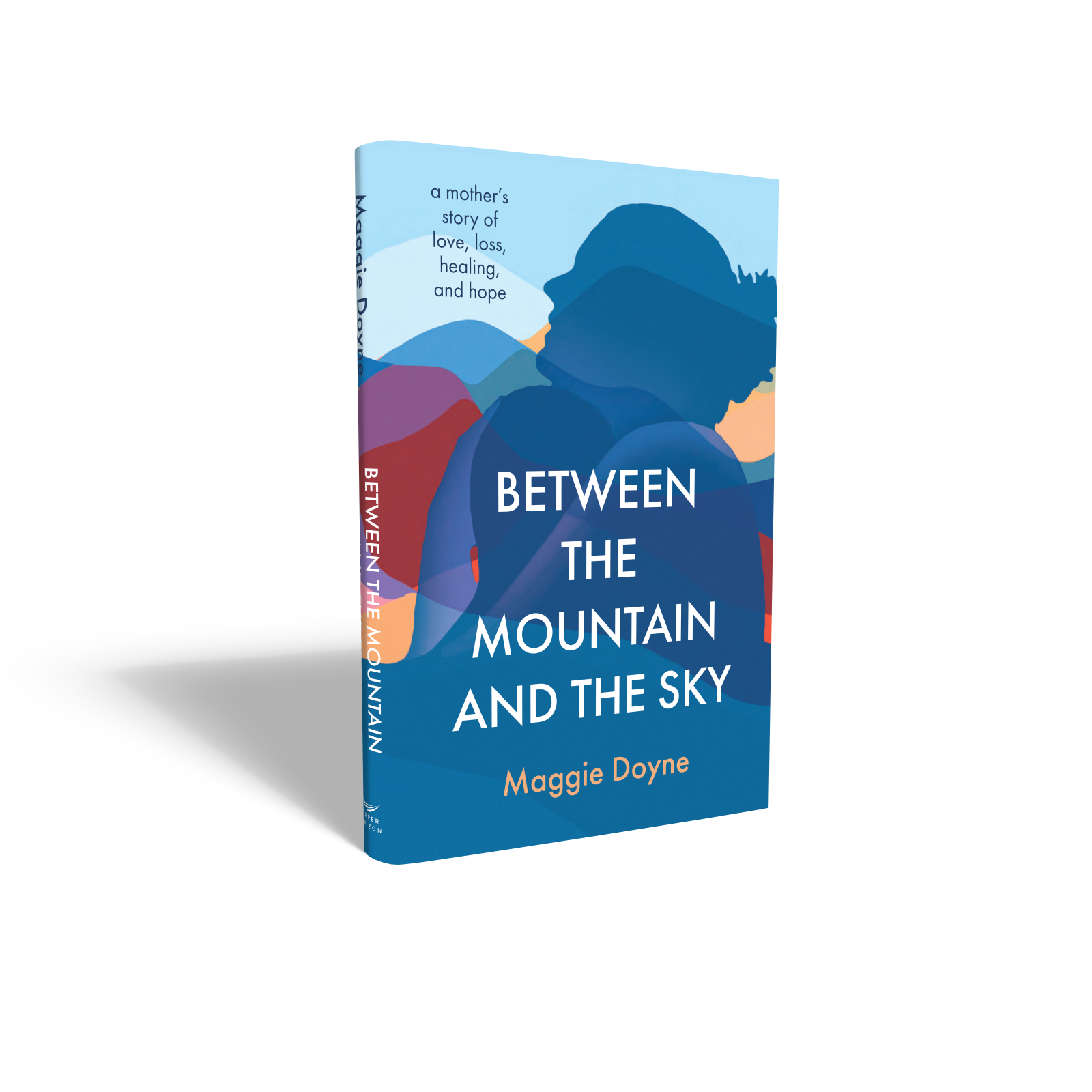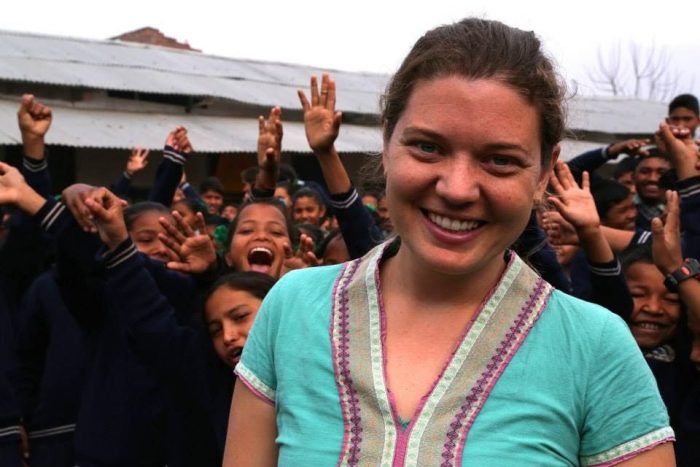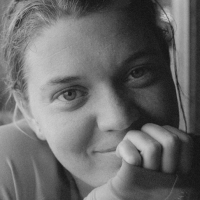Waylon talks with his long-time friend and idol: Maggie Doyne.
Maggie Doyne is co-founder of the BlinkNow Foundation and Kopila Valley Children’s Home and School in Surkhet, Nepal. At age nineteen, she used her babysitting money and worked with the local community to build a home for orphaned children in war-torn Nepal. In 2010, she and her team opened a school for five hundred of the region’s most impoverished children. Throughout the past decade, BlinkNow and Kopila have worked to deepen and grow the organization through grassroots community development efforts.
~
The river in Surkhet is on Nepali time.
It wanders slowly down from the mountains in the Karnali Zone of midwestern Nepal, arriving quiet and exhausted, at barely a trickle, in the center of town. Crawling past the pushcarts and vegetable stands, the cobbler and the transient sacred cows, the water dries up completely, leaving nothing but its luggage of silt and trash in a bone-gray cradle. Rivers are considered holy in this part of the world. You bathe in them and worship in them, whether they rush clear through the foothills or squirm through the mud. Many of the people I’ve met here say that the river is where you go when you die. But the river is where Hima lives.
The first time I see her, she’s a streak of orange, a curl of tangerine skin sitting in the dirt. Rising from the belly of the riverbed, she dusts off the bright, puffy sleeves of what in a previous life must’ve been a party dress, and gets to work.
She can’t be older than five, I guess, standing at the lip of the bank.
I watch her weave between slabs of plastic and cinder blocks and scoop up a stone the size of a soccer ball, waddling it back to her pile of gravel and grunting like a quarryman. She sits cross-legged and whacks the rock over and over, brows scrunched so close that they meet.
No matter where I go, I always seem to end up in places like this one—alleyways, outskirts, trash heaps—the back pockets of a place where less desirable things and people get stuffed away. I’ve been traveling all over the South Pacific and living in India on my gap year, but still, a mix of sadness, fear, and shame hits me under my tongue every time I see these hidden tucked away places. Little kids go to work in some places. They’re porters, laborers on construction sites, domestics, agricultural workers. Watching them work is jarring—watching them work with a smile, even more so.
Beyond the territory she’s staked out in the gully, there are others, all women and children as far as I can see—a coalition of them. Some look thin. Some smile through their sweat and red tikka and patterned, beautifully colored deutis. Nearly all of them look tired, worn ragged and caked in a layer of dust from the riverbed. They wander up and down, looking for rock material they can crush into gravel and sell to developers and road construction projects. After roughly a decade of civil war in Nepal, money is coming in again, and people are building homes, especially in this tiny trading post of a town. In 2006, unsuspecting Surkhet, with its rickety mango stands and freewheeling livestock, is beginning to grow. Plots once rice paddies are sold off by the katta—lots of about thirty-six hundred square feet—and transformed into boxy mud, tin, and brick homes.
Although Surkhet was never fully infiltrated by the Maoists or the government forces, there are quiet, almost polite remains of conflict. Checkpoints with armed guards surround the valley. Soldiers do their morning patrols through the streets, jogging with long, symmetrical strides. Despite these reminders of conflict, it’s borderline idyllic, a paradise in one of the poorest regions in one of the poorest countries in the world. There are more baked goods than bullet holes. The remains of hammer-and-sickle graffiti are worn and almost washed away from monsoon rains. The Himalayan districts just north of here are still in tatters.
Crossing the river is the quickest way back to my hostel, so I start to shimmy down, clods of dry, sun-bleached earth buckling under my feet and turning suddenly into mud in the basin. The scents of human waste and sweaty goat take over. Breathing through my mouth, I ignore the ominous squishing sound that comes up from the bottom of my trekker boots, the wetness that tickles my toes. I try to go unnoticed, feeling a little ashamed, like always, to be happy and fed. Meanwhile life in the river rushes on, starving.
A baby strapped to the back of older child begins to wail. In Nepal, the girl, about fourteen, could be either his sister or his mother. Another baby starts, pitching his apricot-sized fist into the air. Then another. A tiny infant union forms instantly and decides to go on strike. Caregivers start off toward the block of shanty homes made of old rice bags and corrugated metal.
My friend in the orange dress looks up from her hammering. Her eyes, flecked with gold and lack of sleep, lock onto mine.
What am I supposed to do? In this moment, in this life? What are we, as a human family, supposed to do and be?
She drops her mallet, and I look at her like she has the answers. She looks at me like she is the answer.
“Namaste, didi,” she shouts, frantically waving her leathery doll hand my way. A giant sun-soaked smile practically explodes between her cheeks.
Hello, big sister. My Nepali isn’t great, but I know this phrase. Everyone is everyone’s didi here.
I take a long look at her. She takes a long look at me.
“Namaste,” I say back.
The population of the universe dwindles to exactly two: a teenager from Jersey who spent her childhood bouncing on an enormous backyard trampoline and trying to get good grades, and a dalit, “untouchable” who has never seen a school or a toilet. Sifting shoeless through the trash and grinning like a goofy cartoon, there she is, the world’s most unspeakable failure and its unending promise, all tied up with a thin orange ribbon. The plates inside me begin to shift.
I keep walking, knowing with certainty that I’ll see her again, crossing the river and letting her perfect bird voice echo in my head. Namaste, didi.
In another life, she could be my sister.
In another life, she could be me.
~
Taken from Between the Mountain and the Sky by Maggie Doyne. Copyright © 2022 by Maggie Doyne. Used by permission of Harper Horizon.








Read 2 comments and reply